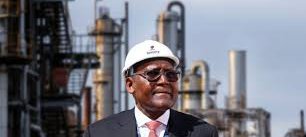
In a move reflecting its deep commitment to the Nigerian people and its mission to ensure access to affordable, high-quality fuel, Dangote Petroleum Refinery has vowed to continue absorbing a substantial portion of rising global oil prices, ensuring that Nigerians continue to benefit from stable fuel costs despite a surge in international crude prices.
The refinery, Africa’s first private refinery, disclosing this in a statement by its Group chief branding and communications officer, Anthony Chiejina, said the move underscores its commitment to the Nigerian people.
The chief branding and communication officer revealed that while the cost of crude oil on the global market rose by 15%, the refinery decided to absorb a significant portion of these rising expenses to shield Nigerian consumers from the full brunt of the global price surge. As a result, the ex-depot price increase remains at 5%, considerably lower than the price hikes experienced in other global markets.
“We wish to clarify that the recent adjustment in our ex-depot price of Premium Motor Spirit (Petrol) is directly related to the significant increase in global crude oil prices. As crude remains the primary input in the production of PMS, any fluctuation in its international price inevitably impacts the cost of the finished product.
“At Dangote Petroleum Refinery, we recognise the critical importance of affordable fuel for all Nigerians, and we remain committed to offering the best value with guaranteed quality to our customers. While we have made a 5% adjustment to our ex-depot price from N899.50 to N950 per litre, it is important to note that this increase is considerably lower than the 15% rise in global crude oil prices, which has seen Brent Crude rise from $70 to $82 in a matter of days, in addition to the premium for Nigerian crude (approximately $3 per barrel) in international markets.
“Furthermore, Dangote Refinery has maintained the Single-Point Mooring (SPM) ex-vessel price at N895 per litre,” he said.
Chiejina also said the refinery kept the Single-Point Mooring (SPM) ex-vessel price stable at N895 per litre while absorbing the increased logistics cost to ensure that its PMS are sold at a uniform price across the 36 states of the federation and the Federal Capital Territory, ensuring that no region is left to bear the full weight of the global oil price fluctuations.
He added that had the refinery not intervened, Nigerians could have been facing an eye-watering increase, with petrol prices potentially climbing to as high as N1,150 or even N1,200 per litre, further compounding the woes of millions of Nigerians already grappling with inflation and economic hardship.
“All our partners, including Ardova, Heyden, and MRS Holdings, will offer petrol to Nigerians at a retail price of N970 per litre nationwide. We have absorbed the increased logistics costs to guarantee uniform pricing across the 36 states of the federation and the Federal Capital Territory (FCT).
“Dangote Refinery has absorbed approximately 50% of the cost increases in the international oil market. This is due to our unwavering commitment to quality and affordability, as well as the ownership of the refinery by Nigerians, which remain central to our mission. If Dangote Refinery were to pass on the entire increase in the price of crude oil to the market, the retail price of PMS would be approximately N1,150 to N1,200 per litre in some locations, compared to the current price of N970 per litre,” he said.
Furthermore, the refinery has committed to maintaining transparency with the public, promising to publish its ex-depot, ex-vessel, and pump prices on a weekly basis. This ensures that consumers remain well-informed and protected from potential price exploitation.
Wholly Nigerian-owned, Dangote Petroleum Refinery prides itself on prioritising national interests, even at the expense of short-term profits.
It could be recalled that Dangote Refinery recently announced an increase in its ex-depot price of Premium Motor Spirit (PMS), commonly known as petrol, from N899.50 to N950 per litre, an action, the company, said was a direct reflection of a spike in global crude oil prices, which recently surged from $70 to $82 per barrel.


